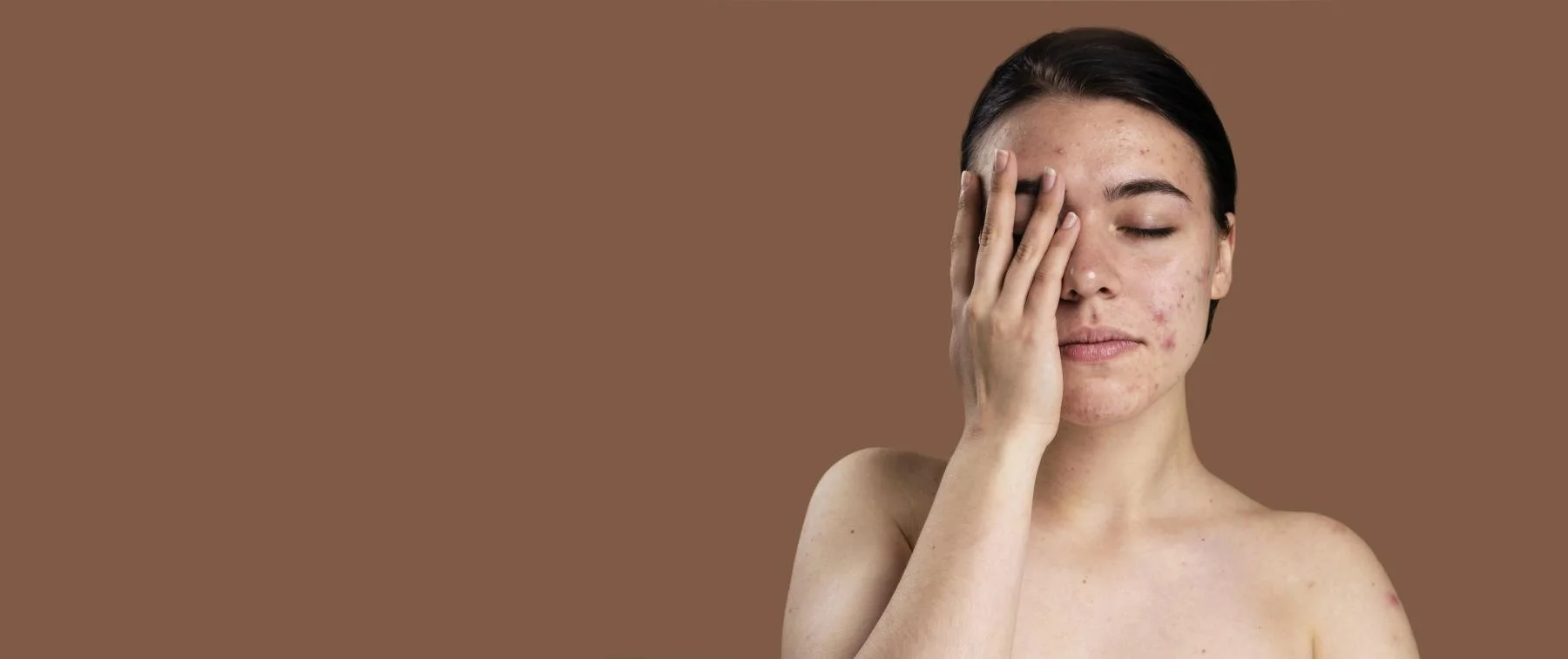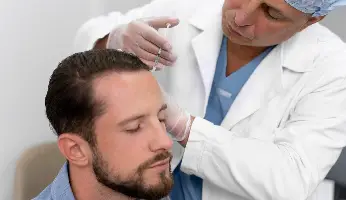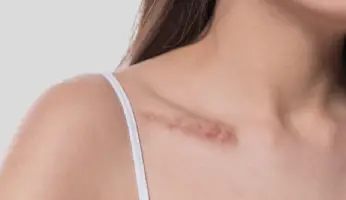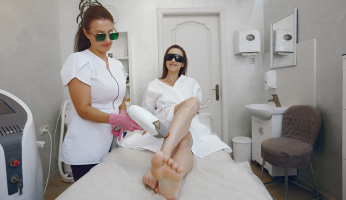
Acne is a common skin complaint characterised by the clogging of skin pores or plugging of hair follicles by excess oil, bacteria, dead skin cells, and dirt. These build-ups result in various non-inflammatory or inflammatory acne, such as blackheads, whiteheads, nodules, papules, and other pimples. Anyone can get acne. It is the most prevalent skin problem, especially seen in adolescents and young adults, because of the increased production of male reproductive hormones such as an-dro-gen.
Acne is found on the face, forehead, chest, shoulders, and upper back. It can be treated depending on the severity of the acne condition, the age of the patient, and the type of acne. The effective acne treatments offered at Charma Clinic include a variety of medications and procedures. Dr. Rajdeep Mysore, the best dermatologist in Bangalore, offers the best treatment.
Signs and Symptoms of Acne
Acne starts developing by clogging the pore and leads to the appearance of a skin lesion. It might range from inflamed, red pimples and pustules to non-inflamed whiteheads and blackheads.
Types of Acne
1. Non-inflammatory acne: It is further differentiated by closed and open skin pores, resulting from no skin inflammation. This form is due to the clogging of pores by sebum and dead skin cells and not bacteria.
- Whiteheads/Closed comedones: These appear as white-coloured, tiny, closed bumps on the skin.
- Blackheads/Open comedones: These are visible on the skin’s surface as black dots. They are open bumps on the skin filled with excess dead skin cells and oil.
2. Inflammatory acne: It forms because of the accumulation of bacteria, dead skin cells, and sebum inside the skin pores. This is further of four types, all characterised by inflammation.
- Papules: They are also named as pimples. These are most typically found on the face as red, irritating skin sores. They form when the wall of a hair follicle ruptures and allows bacteria and cellular debris to infiltrate the skin's deepest layer easily.
- Pustules: These are small, puss-filled, inflamed skin lesions. They are pimples with a white head containing pus, excess oil, and dead skin cells. When a pore ruptures, the body sends signals to protect itself against bacteria, thus forming pus.
- Nodules: These are a more aggressive form of acne that causes hard knots to develop deep underneath the skin. They are large, inflammatory skin lesions that may be skin toned or turn red with more inflammation of the surrounding area. When a hair follicle's wall ruptures, contaminated debris enters the dermis and contaminates nearby follicles. The injury causes swelling in that area of the skin, which is known as nodular acne.
- Cysts: These cysts are the most severe and painful form of acne. They are large, soft, fluid-filled bumps beneath the skin's surface. Acne cysts include both blood and pus.
If one is suffering from any type of acne, one can consult the best acne treatment doctor in Bangalore and get smooth blemishes and acne-free skin with the effective treatment offered at the clinic.
What causes acne?
- Acne is caused by tiny skin pores clogged with sebum, dead skin cells, and sometimes bacteria.
- Acne usually occurs because of excess sebum production in hair follicles or the build-up of dead skin cells in the pores.
- Hormones affect the sebum production by the sebaceous glands. Increased levels of male sex hormones (an-dro-gen) cause more sebum production, which further clogs the pores and results in acne breakouts.
- Acne may be exacerbated by drugs containing male reproductive hormone, lithium, or corticosteroids.
- Some women get acne flare-ups during their menstrual cycle because of hormonal fluctuations.
Acne Treatment is offered at Charma Clinic
1. Chemical peels: These are acid-based skin exfoliants that can help clear the skin pores from dead skin cells and thereby reduce the appearance of acne. The chemical peels are classified into three types based on the strength of the acid used and their skin penetration ability:
- Superficial peel: In treating mild acne, superficial chemical peels such as kojic acid and glycolic acid are typically used. These exfoliate only the skin's outermost layer. It's a lunchtime treatment that must be repeated multiple times for optimal results.
- Medium peel: A medium peel penetrates both the outer and the upper middle skin layers. For the treatment of mild to moderate acne, peels such as salicylic acid are preferred. There is a need for multiple sessions to get the desired results.
- Deep peel: Deep peels are used on the skin of people with severe acne-like cysts and nodules. These work by exfoliating the skin up to the skin dermis. Examples include trichloroacetic acid, and phenol is used to reach the middle layer of the skin. Such peel is used only once, but it requires 14 to 21 days for the skin to heal. Visit now at Charma Clinic to get the best acne and chemical peel treatment in Bangalore.
2. Carbon laser peel treatment: This treatment is beneficial for acne, oily skin, comedones, dull skin, and enlarged pores on the skin. The procedure softens, smoothens, and nourishes the skin. The process involves applying liquid carbon to the skin, which penetrates deep into the skin’s pores. The activated form of liquid carbon is allowed to dry and get adsorbed to what’s clogging the skin pores.
Next, laser light is focused on the dried carbon. This results in the breakdown of the carbon into smaller particles along with dead skin cells, oil, bacteria, and pollutants, which get removed later from the skin. The laser generates heat that kills the bacteria causing acne. It also boosts collagen formation deep into the skin layers. As a result, carbon peels are the most effective therapy for acne and acne scars.
3. IPL skin rejuvenation: IPL skin rejuvenation is a non-invasive therapy that uses high-powered light pulses to improve the appearance of the skin. The light waves are adjusted to remove damaging wavelengths while remaining within the relevant range to heat up and destroy targeted cells.
Acne, wrinkles, dark spots, dull veins, and broken capillaries are all treated with IPL procedures. IPL improves the skin by removing acne-causing pollutants and stimulating collagen synthesis. These two functions aid in reducing skin discolourations such as freckles, birthmarks, age spots, and sunspots, as well as the tightening and smoothing of the skin. IPL increases collagen formation, making the skin smooth and youthful.
Tips for Managing Acne
- Avoid using harsh cleansers that dry out the skin when washing your face. Use an alcohol-free cleaner. It is vital to clear excess oil, filth, and sweat every day to help prevent acne.
- Knowing skin type will help a person choose the proper skin care products. If the skin is oily, choose non-comedogenic creams designed not to clog pores.
- The skin becomes dull and irritated due to dehydration. So, maintain proper water levels in the body.
- Use fragrance-free, non-comedogenic moisturisers after washing your face or when your skin feels dry. Moisturisers keep the skin moisturised.
- Avoid touching your face as much as possible because your hands may hold dirt, grease, and bacteria that could cause acne.
- To manage acne outbreaks, use an over-the-counter product to spot-treat acne as part of a maintenance program.
- Excessive sun exposure dehydrates the skin, causing it to secrete more oil and develop blackheads over time. Use a non-comedogenic, oil-free sunscreen to sun-protect the skin.
- Makeup can clog pores and promote acne breakouts if left for long. Use oil-free, non-comedogenic products, and don’t forget to wash or remove makeup before going to bed.
For more information on acne treatment in Bangalore, visit Charma Clinic.
Frequently Asked Questions on Acne Treatment
What are the factors that aggravate (irritate) acne?
- Changes in hormones
- Food and drink allergies
- Stress
- Beauty products
- Medication side effects
- Some medical issues.
Can adults get acne?
Yes. Acne does not affect an individual based on age. Many youngsters have acne due to a rise in their male reproductive hormones upon reaching puberty. Adult acne can develop because of hormonal fluctuations caused by pregnancy, menstrual cycles, or menopause. It can also occur as a side effect of specific hormone-containing prescriptions, such as birth control and hormonal supplements, as well as other treatments, such as steroids or seizure medication. Some adult men and women continue to get acne because of their genetic build-up that allows their pores to clog too easily. For adult acne treatment in Bangalore, one can book an appointment with the skin experts at Charma Clinic.
When should I consult a dermatologist about acne?
If over-the-counter acne treatments and gentle face washing aren't working for an individual, it's time to contact a dermatologist in Bangalore. Severe acne necessitates having a more effective treatment plan to avoid acne scarring.
Does makeup affect acne?
Makeup does not always cause acne, but it can aggravate it. If an individual suffers from acne, they don't have to quit wearing cosmetics altogether. If a person feels that their foundation is causing problems, they should try a different brand or a different style of makeup. Remember other things that may get on the skin; shampoos, hairsprays, and hair gels can all contribute to forehead breakouts. Look for types of cosmetics and other makeup products that are labelled "non-comedogenic." That is, they will not clog the pores.
How important is it to wash my face?
Acne is rarely the result of a poorly cleansed face. Many acne sufferers overwash their faces. Washing the face too frequently can aggravate the situation. Scrubbing too hard may worsen the acne condition. Additionally, certain alcohol-based astringents may be very drying to the skin. That said, cleansing the face every night with water and a light cleanser is beneficial for people with acne. Most types of acne, however, necessitate more than simply keeping the face clean.
Does what I eat affect my acne?
An individual may have heard that consuming oily foods, dairy products, or sweets can cause acne. That is, for the most part, not the case. The hormones activate the oil glands and create sebum, which clogs or blocks pores and is the primary cause of acne. Bacteria accumulate inside the pores, causing them to swell and cause outbreaks. No matter what an individual consumes, significant hormonal changes occur.
Teenage years (puberty) and menstrual cycles are two familiar sources of hormonal changes. However, what an individual eats may affect their acne appearance. According to research, eating a lot of sugar and low-fat dairy products can worsen the condition.
If you're looking for an acne treatment close to where you are, you can quickly check it up on Google by searching "best acne treatment near me". Additionally, you may call or visit Charma Clinic.




